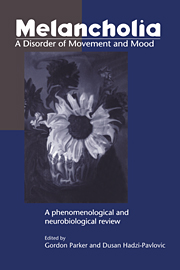Book contents
- Frontmatter
- Contents
- List of contributors
- Acknowledgments
- Introduction
- Part One Classification and Research: Historical and Theoretical Aspects
- Part Two Development and Validation of a Measure of Psychomotor Retardation as a Marker of Melancholia
- 5 Psychomotor Change as a Feature of Depressive Disorders: Historical Overview and Current Assessment Strategies
- 6 Development and Structure of the CORE System
- 7 Reliability of the CORE Measure
- 8 Validity of the CORE: I. A Neuroendocrinological Strategy
- 9 Validity of the CORE: II. Neuropsychological Tests
- 10 Validity of the CORE: III. Outcome and Treatment Prediction
- 11 Phenotypic Expression of Melancholia Contrasted for Those with Bipolar and Unipolar Illness Courses
- 12 Psychotic Depression: Clinical Definition, Status and the Relevance of Psychomotor Disturbance to Its Definition
- 13 A Clinical Algorithm for Defining Melancholia: Comparison with Other Sub-typing Measures
- 14 Rating the CORE: A User's Guide
- Part Three The Neurobiology of Melancholia
- The CORE Measure: Procedural Recommendations and Rating Guidelines
- References
- Author Index
- Subject Index
9 - Validity of the CORE: II. Neuropsychological Tests
from Part Two - Development and Validation of a Measure of Psychomotor Retardation as a Marker of Melancholia
Published online by Cambridge University Press: 04 August 2010
- Frontmatter
- Contents
- List of contributors
- Acknowledgments
- Introduction
- Part One Classification and Research: Historical and Theoretical Aspects
- Part Two Development and Validation of a Measure of Psychomotor Retardation as a Marker of Melancholia
- 5 Psychomotor Change as a Feature of Depressive Disorders: Historical Overview and Current Assessment Strategies
- 6 Development and Structure of the CORE System
- 7 Reliability of the CORE Measure
- 8 Validity of the CORE: I. A Neuroendocrinological Strategy
- 9 Validity of the CORE: II. Neuropsychological Tests
- 10 Validity of the CORE: III. Outcome and Treatment Prediction
- 11 Phenotypic Expression of Melancholia Contrasted for Those with Bipolar and Unipolar Illness Courses
- 12 Psychotic Depression: Clinical Definition, Status and the Relevance of Psychomotor Disturbance to Its Definition
- 13 A Clinical Algorithm for Defining Melancholia: Comparison with Other Sub-typing Measures
- 14 Rating the CORE: A User's Guide
- Part Three The Neurobiology of Melancholia
- The CORE Measure: Procedural Recommendations and Rating Guidelines
- References
- Author Index
- Subject Index
Summary
Neuropsychological Testing in Depression
Although extensively researched (see Watts 1992; Austin et al. 1992b), neuropsychological testing in patients with depressive disorders continues to reveal disparate findings, though clear evidence of impairment across a range of functions has been documented in those patients with more severe and/or psychotic disorders, those hospitalized for treatment and/or those receiving psychotropic medication (Robbins, Joyce and Sahakian 1992). The deficits described have primarily involved the domains of attention, concentration and motor speed (the so-called “subcortical” tasks). Various aspects of memory and planning have also been noted to be affected, though the nature of such impairments has often been described in non-uniform terms, reflecting the specific cognitive paradigm under investigation. In the interpretation of memory impairment, emphasis continues to be placed on the possible roles of effort, motivation and attention to the task, all of which are impaired in depressed patients. However, memory deficits that do not reflect such factors are probably a feature of most depressive disorders (Austin et al. 1992b). Aphasias and apraxias (cortical tasks), have not generally been associated with depressive disorders and, when present, have typically been considered as positive evidence of an underlying dementing disorder.
Differential patterns of neurocognitive impairment may be evident in less severe forms of depression (i.e., greatest impairment in subcortical rather than cortical tasks). It has been suggested that the most severe forms of depression are also associated with more significant memory and frontal deficits (Austin et al. 1992b).
- Type
- Chapter
- Information
- Melancholia: A Disorder of Movement and MoodA Phenomenological and Neurobiological Review, pp. 149 - 159Publisher: Cambridge University PressPrint publication year: 1996
- 8
- Cited by

